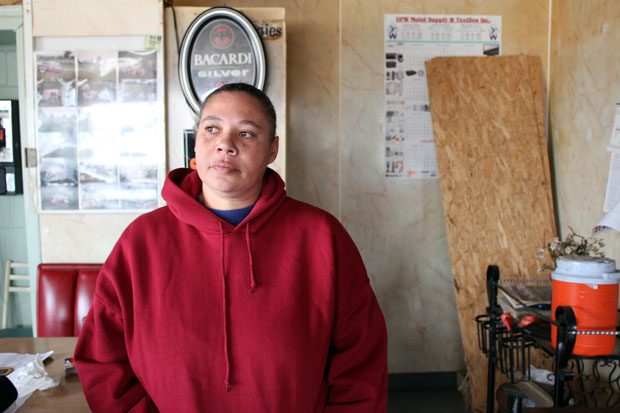
Caption
Joe Wertz / NPR StateImpact


Caption
Joe Wertz / NPR StateImpact

Joe Wertz / NPR StateImpact
What could help Boley, a small town Oklahoma's most poverty-stricken county? "Jobs," says Leonice Banks-Mitchell, owner of McCormick's Grill.
Boley’s biggest employer is a state prison, the John Lilley Correctional Center, which houses about 800 inmates on any given day, officials there say.
Technically, more than half the town is behind bars.
You’ve heard of a one-horse town. Boley is a one-restaurant town, and its owner has a lot of perspective on life in the most poverty-stricken county in Oklahoma.
“People are struggling,” says Leonice Banks-Mitchell, who owns McCormick’s Grill on the south side of U.S. 62 in Boley.
Everyone calls her “Pookie,” and her eponymous hamburger and soul food Sunday dinners are legendary.
Pookie grew up working at the restaurant, which her uncle built.
Pookie moved to Oklahoma City in 1985 to work for a janitorial service company. In 1988, she moved again, this time to California to help her aunt manage a restaurant there.
Pookie returned to Boley in 1999 at the request of her uncle, who was suffering from congestive heart failure. She helped him run the restaurant until 2002, when he died.
Her uncle left her everything, including the restaurant. The restaurant is paid off, she says. If it weren’t, she doesn’t know if the restaurant would survive.
“Business is so slow,” she says. “Businesses is not like it used to be.”
Poverty in Oklahoma is at a 10-year high. Things are particularly bad in Okfuskee County, where 27.3 percent of its residents lived at or below the poverty line in 2010, according to data from the U.S. Census Bureau. Statewide, the poverty rate is 16.8 percent.
[module align=”left” width=”full” type=”pull-quote”]
“I’m retired, but I’ve got to go back to work.”
[/module]
The flow of customers was steady until 2002, Pookie says. Most of her customers come from the highway; people driving to and from work. When there’s no work, there’s no traffic — and no hungry commuters.
“As long as I can make enough to pay the bills, I stay running,” she says.
The struggle forces people to hustle, Pookie says.
“You see people hauling iron and steel, picking up trash here and there and hauling it off,” she says.
Pookie’s husband, Jerry Mitchell, is among those salvaging and collecting scrap metal to sell to a nearby recycler.
Prior to meeting and marrying Pookie, Mitchell worked as a glazier in Minnesota. He retired early and moved to Boley to be with his wife.
Even after 30 years “in the trades,” his partial pension isn’t enough.
“I’m retired, but I’ve got to go back to work,” he says, and selling scrap metal is about the only occupation he can find in town. Mitchell has been filling out applications for regular employment, too. He recently applied for a job at a grain mill in Shawnee.
That’s 46 miles away.
The number of non-farm jobs in Okfuskee County declined almost 25 percent from 2000-2009, Census data show. Agriculture used to be a big in Boley. But it’s not anymore, Pookie says.
The town’s mayor, Joan Matthews, says most residents are retirees who moved back and don’t need to work. Quiet, historically rich Boley is a great place to live, she says, just don’t try to find a job there — or a school.

Joe Wertz / NPR StateImpact
Most of the restaurant's customers come from nearby U.S. Highway 62. Traffic — and customers — drop when there's no work in the area, the owner says.
The Boley high school was shuttered in 2006, and the town’s pre-kindergarten through 8th grade program followed suit a few years later. The Boley School District was consolidated in 2010 and merged with one in Okemah, which is 12 miles away.
Now, Boley’s students bus there or attend class in Paden, which is 6 miles away. “Motivation” is an understandable problem that plagues local students, Pookie says.
“By the time you get up early to catch the bus to go to Okemah and get on that bus to come back home, you’re kind of a little worn out,” she says.